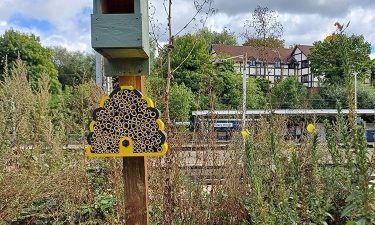Good News Friday: Your weekly round-up of positive rail news!
Posted: 20 September 2024 | Global Railway Review | No comments yet
In this week’s ‘Good News Friday’, we cover Union Pacific’s community grants supporting local initiatives, Great Northern’s biodiversity efforts and GTR’s award-winning solar energy project.


Union Pacific awards grants to support local communities across 23 states


Credit: Union Pacific
Union Pacific Railroad’s Community Ties Giving Program has awarded over $5.2 million in grants to 487 non-profit organisations across the 23 states where the company operates. The grants, ranging from $5,000 to $30,000, aim to benefit local communities by supporting initiatives related to safety, workforce development, community vitality and environmental sustainability.
These funds will contribute to projects that promote neighbourhood safety, career development opportunities for students, park revitalisations, and new environmental programmes. “Union Pacific believes in the power of local, grassroots organisations to create positive and meaningful change in communities,” said Union Pacific President Beth Whited. The company views these grants as part of its commitment to fostering safe and thriving communities.
The annual application process for the grants opens each April and follows a competitive selection procedure to ensure all eligible organisations have a fair chance to receive funding.
Great Northern enhances biodiversity with ‘Homes for Nature’ at stations


Credit: Great Northern
Great Northern has partnered with the Bee Friendly Trust to boost biodiversity across its rail stations. This initiative comes in response to the alarming threat of extinction facing one in six species in the UK, as highlighted in the State of Nature report, which shows a 19% decline in species since 1970.
To combat this, GTR has installed over 20 “homes for nature” at six stations: Bayford, Cuffley, Grange Park, Hadley Wood, New Barnet and New Southgate. These homes include bird boxes, bug hotels for solitary insects, and hibernacula, which serve as shelters for small animals during winter.
Eloise Rowan, GTR’s environment specialist, said: “At GTR we’re committed to creating a railway for nature by enhancing biodiversity and encouraging nature recovery. Our Homes for Nature initiative is just one way we plan to support a thriving natural environment. Nature is in crisis in the UK with the latest State of Nature report detailing that since 1970 UK species have declined around 19% on average and nearly one in six species are now threatened with extinction.”
Dr. Luke Dixon, Director of the Bee Friendly Trust, said: “Our rail network gives wonderful opportunities to create homes for nature and provide a network not just for trains, but for wildlife of every kind – from deer to butterflies – to move safely around the country. Great Northern links habitats in the heart of the city to the depths of the countryside.”
GTR and Energy Garden win Environmental Excellence Award for solar energy initiative


Credit: Govia Thameslink Railway
Govia Thameslink Railway (GTR) and London-based Community Benefit Society Energy Garden have won the prestigious Environmental Excellence Award at the National Rail Awards, often called the “Oscars of the rail industry,” for their innovative solar energy initiative.
Energy Garden is installing community-owned solar panels on the roofs of GTR’s railway depots, including locations such as Streatham Hill, Bedford Cauldwell Walk, Selhurst and Three Bridges. The project is designed to generate clean, green energy for the depots, helping GTR achieve its net zero targets. Surplus energy will be exported to the national grid, providing power to other UK organisations.
In addition to supporting clean energy, the project will fund Energy Garden’s community engagement efforts, including urban greening initiatives and education programmes for young people in deprived areas of London.
As the largest community energy organisation in London, Energy Garden raises all capital costs through community investment. The success of this initiative highlights the potential for scaling up similar projects across the rail industry by utilizing under-used depot roofs.
The award judges praised the project, saying it “takes public transport’s role in tackling the climate crisis to the next level” by generating renewable energy with no upfront costs to operators.
Related topics
Funding & Finance, Sustainability/Decarbonisation, The Workforce
Related organisations
Govia Thameslink Railway (GTR), Great Northern, Union Pacific






